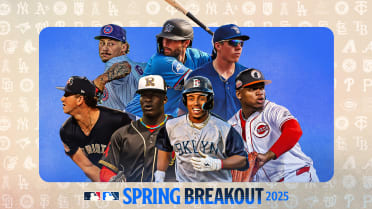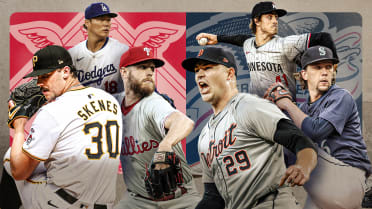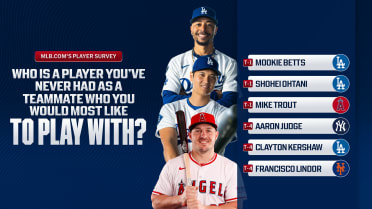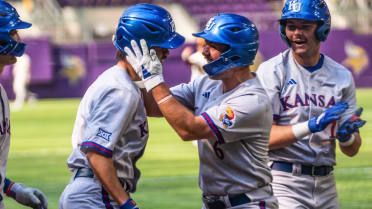From hoops to the mound: How Abreu became a power arm
This story was excerpted from Brian McTaggart’s Astros Beat newsletter. To read the full newsletter, click here. And subscribe to get it regularly in your inbox.
HOUSTON -- When the Astros put together a two-on-two basketball shooting tournament to break up the monotony of Spring Training in 2019, ace pitcher Justin Verlander picked a rookie reliever that he didn’t know much about to be his teammate.
Bryan Abreu was 6-foot-1, but he had broad shoulders and appeared to know his way around the court. That was good enough for Verlander, who, unbeknownst to him, had picked the best basketball player on the roster. Abreu played competitive basketball growing up in the Dominican Republic. In fact, the Verlander/Abreu team was so dominant, the tournament was never completed.
“I was too good,” Abreu joked.
Abreu was eventually steered towards baseball and signed with the Astros as a 16-year-old in 2013. The decision to play baseball was a wise one, considering Abreu has emerged as one of baseball’s best relievers over the past couple of years. He posted a 1.94 ERA in 55 games in 2022 and a 1.75 ERA in 72 contests last year, striking out 100 batters in 72 innings.
His success on the baseball field is a credit to his work ethic and the family back home in the Dominican Republic that made sure he stayed on the right track. Abreu grew up in the barrios of Simón Bolívar and Las Cañitas in the nation’s capital of Santo Domingo, where he saw friends get involved in drugs and crime.
“I grew up in kind of like a dangerous neighborhood, but I just grew up in a sport environment,” Abreu said. “I’ve been playing basketball my whole life, and then I just got into baseball because of my friends. They just loved to play baseball. I didn’t know people get signed if you have talent.
“My mom asked me which sport I would love to play, and as a kid, I chose basketball. I couldn’t go to the field with my friends, but if I chose baseball, I [could] sneak into the basketball court and my mom [didn't] even notice. I said, ‘OK, I decided to play baseball,’ and I started to do really good.”
Abreu grew up watching basketball on TV with his dad, who was a fan of the Lakers. That meant Bryan was also a fan of the Lakers and the team’s stars of that era: Lamar Odom, Pau Gasol and later LeBron James.
“My dad has played basketball his entire life, and he’s still playing it,” Abreu said. “I just grew up watching my dad. We have small basketball courts around the house and in the school and street. I used to play a lot of basketball with my friends.”
But it was while playing baseball that a scout was intrigued by what Abreu could do on the mound. He was invited to work out for the Astros at their Dominican Academy, where international scouting director Oz Ocampo, international crosschecker Marc Russo and national supervisor Rafael Belén watched.
A skinny Abreu was throwing in the mid-80s, but he quickly made some adjustments, and the Astros were sold. They signed him for $40,000 -- a life-changing amount of money. Abreu’s dad, Enrique Abreu, used to be a motorcycle delivery driver for hospitals. His mother, Belkys Simenez, worked customs at a port in Santo Domingo.
“When I signed, that was the first time that I knew baseball players could get money,” Abreu said. “I was playing in the Dominican Summer League when I got my first paycheck. I just gave my whole check to my mom to pay the rent and stuff.”
The check was for $275.
Now that he’s an established big leaguer and has made millions in his career, Abreu, who has a 2-year-old son named Ryan, has purchased a house for his mother and a car for his father. His sister recently got married and he made sure she had a nice apartment. Abreu has remained grounded and humble because of his family and his upbringing.
“My mother has always been there, just like my dad, too,” he said. “My dad was always trying to get me some cleats and some gloves and stuff. Trying to be there for me every single time. They never asked me for anything economically, and they know it was a hard road, but he and my mom were working trying to help me as much as they can, making sure I have all the food and all the nutrition. They helped me a lot in that aspect.”
Supervising Club Reporter Brian McTaggart has covered the Astros since 2004, and for MLB.com since 2009.





